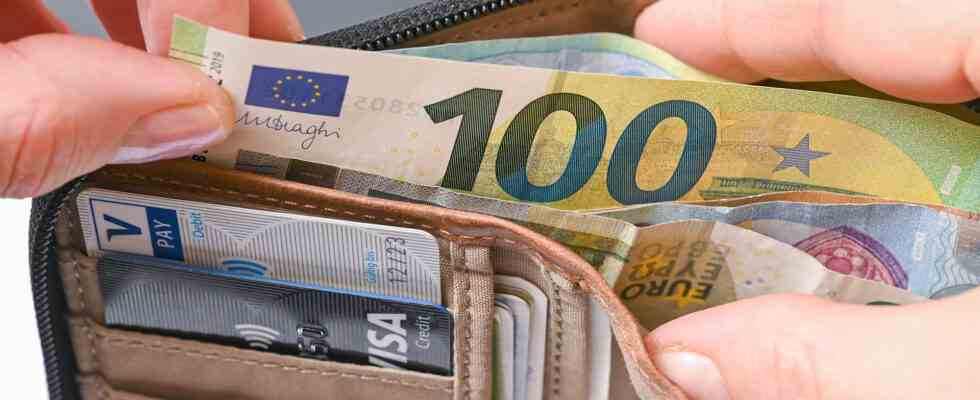FAQ
Status: 10/27/2022 2:32 p.m
With the inflation compensation premium, the federal government wants to relieve millions of employees. Special payments of up to 3000 euros are exempt from tax. How does it work and who benefits from it?
As part of the federal government’s third relief package, the so-called inflation compensation premium was introduced, which can now be used since October 26. Who benefits and how does the bonus work?
What is the Inflation Compensation Premium?
The so-called inflation compensation premium is essentially a tax allowance. No taxes or social security contributions have to be paid on additional payments by employers to employees. Normal wages and salaries are expressly not recorded, only additional payments, such as one-off payments.
How high is the inflation compensation premium?
The federal government has set a maximum limit for the inflation premium. According to this, payments of up to 3000 euros per employee can benefit from the tax and duty exemption.
Who can get the reward?
In principle, all employees can receive the bonus. Both full-time and part-time employees as well as those in marginal employment such as mini-jobbers, working students and trainees can receive the bonus.
What does this mean for the unemployed?
According to a statement by the Federal Government, the Unemployment Benefit II/Social Security Ordinance will be supplemented in such a way that the inflation compensation premium for income-related social benefits is not counted as income. This means that if the recipients are dependent on social benefits, the money will not be counted against their income.
Who grants the inflation compensation premium?
Employers can grant the one-off payment. But that also means that the premium is voluntary – companies do not have to pay the premium to their employees.
Employers can also decide how much money to transfer to their employees. Only the maximum rate of 3000 euros is fixed. It is possible to pay out the tax-free amount either as a one-time payment or alternatively in several partial amounts.
Can the bonus only be paid out in cash?
no Employees can also receive the inflation premium in the form of benefits in kind. However, these must serve to relieve them in times of high inflation. These can include vouchers for refuelling, goods and meal vouchers. If the company already pays such benefits in kind, these may not be converted into the inflation premium.
Is there a legal right to the bonus?
In principle, there is no legal entitlement to the money, because there is no entitlement to special payments from the employer, which in turn are prerequisites for tax privileges from the state. However, if there are collective bargaining agreements for employees based on collective bargaining agreements, the bonus can become part of the collective bargaining agreement. Employees are then entitled to the inflation compensation premium.
What do employers have to consider when making payments?
The inflation compensation premium must be granted in addition to the wages that are already owed. So it cannot be offset. Every employer can only use the tax and duty exemption for an additional payment.
When granting the premium, employers must make it clear that this is related to the price increase – for example by making a corresponding note on the transfer slip as part of the pay slip.
Employers must also keep an eye on the principle of equal treatment: if employees or groups of employees are exempt from paying the inflation compensation premium, there must be an objective reason for this.
When can the bonus be paid out?
According to the federal government employers have been able to grant their employees the payment since October 26. The opportunity is limited until December 31, 2024.
What is the basis for the bonus?
This is the basis for the inflation compensation premium “Law on the temporary reduction of the sales tax rate on gas deliveries via the natural gas network”. It was promulgated in the Federal Law Gazette on October 25, 2022 and came into effect retrospectively as of October 1, 2022.
The background to the relief measure is the high level of inflation in Germany, which has climbed to its highest level in decades, in particular due to the sharp rise in energy prices as a result of the Russian war of aggression in Ukraine. The inflation compensation premium is intended to mitigate the consequences of these price increases and is also a contribution to making one-off payments from employers more attractive. This is happening against the background of high union wage demands and warnings of a wage-price spiral.
How much tax revenue is the state missing as a result?
The Federal Ministry of Finance expects the measure to reduce tax revenue by around 1.2 billion euros. The tax losses relate solely to corporate taxes as a result of the reduction in profits due to the deduction of payments as operating expenses.
How great is the risk of the bonus being misused?
Tax unionists and tax consultants have already warned against fraud with the introduced inflation compensation premium. As the federal chairman of the German Tax Union (DSTG), Florian Koebler, told the “Bild-Zeitung”, the state “runs the risk of being gutted like a Christmas goose”.
Köbler explained, for example: “Neighbours, friends or members of criminal clan families appear to hire each other with an employment contract, then pay each other the 3,000 euro bonus and can thus reduce their wage tax and other social security burden.” Another possibility is that parts of the usual wages, for example for cleaning staff or sales staff, are replaced by an alleged bonus payment and thus smuggled past the tax authorities.
What does the Federal Ministry of Finance say about this?
The Federal Ministry of Finance explained that there are currently no known fraud models when it comes to inflation premiums. The models that the tax consultants warned about are not allowed anyway, so the tax exemption cannot be applied to them.

